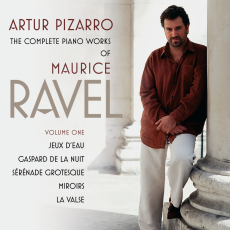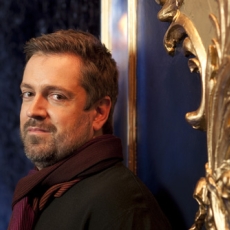Ravel - Pizarro - Fanfare
Artur Pizarro is the house pianist for Linn, a Scottish firm primarily known for their beautifully made and very expensive stereo equipment. Unlike other “audiophile” productions, where the kind of microphone cable used can get equal billing to the performer, Linn recordings focus on the music and the music-making (it can be safely assumed that Linn gear is used). Pizarro, Portuguese born and a long-time student of Sequeira Costa, takes nothing for granted in his playing, as he has demonstrated in the music of Chopin as well (there are also Beethoven recordings from Linn which I do not know). On the Chopin CD, Pizarro was best in the lower temperature material, producing luxurious, beautifully controlled tonalities in the nocturnes. In the bigger pieces, including a polonaise and a scherzo, his approach was singular, lacking the bravura and histrionics routinely applied to these works, which were imbued instead with a poetic ease that seemed natural and surprisingly true to the nature of the music.
In the music of Ravel, which is even less metronomic than that of Chopin, Pizarro’s way produces gorgeous, memorable playing. I’ll cut to the chase here; this is Ravel-playing of sensuality, range of color, and depth of poetry that is in a league with prewar Gieseking, the universally acknowledged touchstone for this repertoire. And here we get glistening, modern sound. What more can you ask for, why read on? Certainly, if you were to close this magazine at once and go off to purchase this release, I doubt you will be disappointed. Yet, I am duty bound to offer a few caveats. There are other ways to play this music that are valid and for some, perhaps preferable. Pizarro is never overtly virtuosic, and his “Scarbo” is not nearly as explosive as it can be in showier performances, for example. Also, for pianists with the technique to pull it off, it is fascinating to hear Ravel with less pedal and more detail, such as we get in Pierre-Laurent Aimard’s recent Gaspard de la nuit or Frederic Chui’s crystalline Miroirs. In both cases, but especially so in the Aimard recording, Ravel is expressed with an intellectual clarity and structure that offers a special insight into the composer’s genius.
When Pizarro (or Gieseking) plays this music, the emotional side of the music completely trumps the cerebral. The effect is hypnotic; you really don’t want to listen to it any other way. It is great that there actually are other ways to play this trove of masterpieces, but Pizarro goes to the top of the heap in this desert-island pick (the island, of course, must have an endless supply of electricity and a decent SACD player). A fantastic release, then, and a must-hear for Ravel-lovers. Bring on Volume 2!

